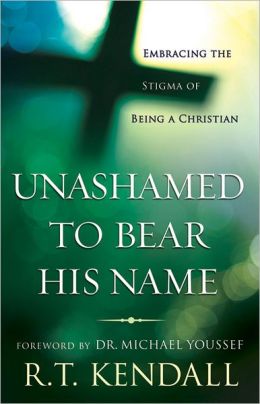R. T. Kendall, Unashamed to Bear His Name: Embracing the Stigma of Being a Christian
 R. T. Kendall, Unashamed to Bear His Name: Embracing the Stigma of Being a Christian (Bloomington, MN: Chosen, 2012), 208 pages, ISBN 9780800795160.
R. T. Kendall, Unashamed to Bear His Name: Embracing the Stigma of Being a Christian (Bloomington, MN: Chosen, 2012), 208 pages, ISBN 9780800795160.
“Ashamed of the Gospel? Who, me?” Today it is easier than ever for individuals to proclaim their religious preference. Targeted mass marketing has made it possible for modern Christians to exhibit their faith at all times with a variety of novelty items. You can wear a parodied Christian t-shirt and offer someone a Bible shaped mint while listening to Christian music in your fish decaled car. In such a Western Christian culture where faith is almost expected to be constantly on display, it can be difficult to admit that there are times when one feels embarrassed, or even ashamed, to be associated with the term “Christian.” I will be the first to admit that I have my list of “Christianisms” that cause me to cringe when I see them acted out in the public arena. I am even more ashamed to confess that there are some aspects of the Gospel message itself are not the most pleasant for me to explain to someone outside of the Christian faith. These are both reasons that the term “Christian” carries (and has always carried) a stigma in the larger realm of society. This stigma is what R. T. Kendall sets out to wrestle with in Unashamed to Bear His Name.
Beware popularity. Biblical Christianity is offensive to unredeemed sensibilities.
While Kendall admits that much time can be spent arguing over what is offensive and what is not, he lists several activities that he feels are important parts of the unashamed Christian lifestyle. Although the efficacy of the method elicits mixed reactions, Kendall includes confrontational street witnessing in his list, confessing that even he felt ashamed of the behavior at first. At the end of his book he lists three distinct doctrines that, while they can be extremely offensive to non-believers, he believes the church must uphold: creation, predestination, and eternal punishment. Kendall also takes a side in the debate concerning the place of social justice in the Gospel message and strongly cautions that believers not shy away from presenting the stigma of the Gospel as the primary focus when reaching out to the lost.
Category: Living the Faith, Spring 2013


